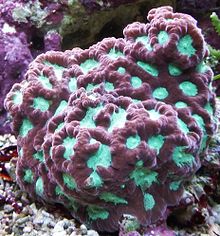Favites
| Favites Temporal range:
| |
|---|---|

| |
| Favites pentagona | |
| Scientific classification | |
| Domain: | Eukaryota |
| Kingdom: | Animalia |
| Phylum: | Cnidaria |
| Class: | Hexacorallia |
| Order: | Scleractinia |
| Family: | Merulinidae |
| Genus: | Favites Link, 1807 [1] |
| Species | |
|
See text
| |
| Synonyms | |
|
List
| |
Favites is a genus of stony corals in the family Merulinidae. Members of this genus are native to the Indo-Pacific region and their ranges extend from the Red Sea through the Indian Ocean and Western Pacific Ocean as far as Japan, the Line Islands and the Tuamotu Islands.[2]
Characteristics
[edit]Colonies can be encrusting but are usually massive and dome-shaped. The corallites are mostly cerioid (sharing a common wall), but some are plocoid (with an individual wall) and the palliform lobes are indistinct, which distinguishes these corals from the otherwise similar Goniastrea.[1][2]
Species
[edit]The following species are currently recognized by the World Register of Marine Species :[1]
- Favites abdita (Ellis & Solander, 1786)
- Favites acuticollis (Ortmann, 1889)
- Favites chinensis (Verrill, 1866)
- Favites colemani (Veron, 2000)
- Favites complanata (Ehrenberg, 1834)
- Favites favosa (Ellis & Solander, 1786)
- Favites flexuosa (Dana, 1846)
- Favites halicora (Ehrenberg, 1834)
- Favites magnistellata (Chevalier, 1971)
- Favites melicerum (Ehrenberg, 1834)
- Favites micropentagonus Veron, 2000
- Favites monticularis Mondal, Raghunathan & Venkataraman, 2013
- Favites paraflexuosus Veron, 2000
- Favites pentagona (Esper, 1795)
- Favites rotundata Veron, Pichon & Wijsman-Best, 1977
- Favites solidocolumellae Latypov, 2006
- Favites spinosa (Klunzinger, 1879)
- Favites stylifera Yabe & Sugiyama, 1937
- Favites valenciennesi (Milne Edwards & Haime, 1849)
- Favites vasta (Klunzinger, 1879)

Fossil record
[edit]Fossils of Favites are found in marine strata from the Jurassic to the Quaternary (age range: from 161.2 to 0.0 million years ago.). Fossils are known from many localities in Europe, Indonesia, Philippines, Africa, North America, South America, Pakistan, Japan and India.[3]
References
[edit]- ^ a b c Hoeksema, Bert (2015). "Favites Link, 1807". WoRMS. World Register of Marine Species. Retrieved 2015-04-25.
- ^ a b Sprung, Julian (1999). Corals: A quick reference guide. Ricordea Publishing. pp. 110–111. ISBN 1-883693-09-8.
- ^ The Paleobiology Database
